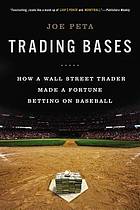
Trading Bases
A Story About Wall Street, Gambling, and Baseball (Not Necessarily in That Order)
کتاب های مرتبط
- اطلاعات
- نقد و بررسی
- دیدگاه کاربران
نقد و بررسی

December 10, 2012
A Wall Street honcho takes his analytic skills to the big leagues in this rollicking financial adventure. With time on his hands after losing his job and getting run over by an ambulance, Peta, a former Lehman Brothers stock trader, concocted a numerical model that he hoped would predict the outcomes of Major League baseball games better than Las Vegas oddsmakers did—and turned his betting on the 2011 season into a toy investment fund. His lark prompts a fascinating tour of the science of “sabrmetrics,” which translates individual players’ stats—home runs, strike outs, and more exotic performance measures—into win-loss forecasts and playoff picks. (The deftly explained math only enhances the ball-park drama, especially when the Minnesota Twins go on an unexpected winning streak that threatens to sink the fund’s returns.) The author applies his baseball-gleaned insights on the all-important difference between luck and skill to Wall Street’s betting parlors, probing Lehman Brothers’ disastrous risk-management failures and wondering why traders aren’t evaluated as shrewdly as pitchers are. Peta’s hardheaded but warmhearted narrative reads like a mashup of Liar’s Poker and Moneyball peppered with besotted evocations of emerald green outfields and sports-bar camaraderie. His is that rare finance saga that’s both smart and loads of fun.

January 15, 2013
A fun approach to developing the discipline necessary to separate reproducible skills from the disruptive effects of chance in baseball, finance and life. Peta's 15-year career as an equity trader with Lehman Brothers abruptly ended when an ambulance ran into him and crushed his leg. The author discusses how he pulled his life back together in the months when he was laid up, unable to walk and separated from his family on the West Coast. Peta developed a system for betting on baseball and began the work to turn it into a business. Conceptually, the author built on the work of predecessors from the sabermetrics school of baseball statistical analysis like Bill James and Nate Silver. Peta worked on developing statistical indicators that might give him an edge in the 2011 season, looking to find ways to separate analysis of acquired skills from chance or accident. Peta's approach is helpful to understanding statistical analysis in any field, not just the chosen baseball specialty. He applies the same approach to Wall Street trading results and showing how using profit-and-loss results to assess a manager's performance can be as misleading as using wins to identify a team's best pitcher. Neither reflect quantification of developable skill sets, but rather uncontrollable external factors. Peta's system was ready for operation by the beginning of the 2011 season; by August, he was able to walk, ready for the coming World Series. His system ended its first season comfortably ahead. The main focus on baseball provides a starting point for much more.
COPYRIGHT(2013) Kirkus Reviews, ALL RIGHTS RESERVED.

February 1, 2013
Peta, a successful Wall Street trader, found himself confined to a wheelchair in early 2011he had suffered multiple injuries after being struck by an ambulance as he was walking in Lower Manhattanand then fired by his employer, Nomura Securities. Reengaging with the world by joining his love of statistical analysis to baseball, Peta created a reliable system for beating Vegas odds throughout the 2011 Major League season. It would be easy to call out Peta for cynically using sport for financial gainand he can be unnervingly detached when crunching numbersbut it's clear that he loves the game itself as much as the winnings. Moreover, he asks a number of salient questions, such as: How can businesses on Wall Street and beyond apply the thinking used by baseball sabermetricians to strengthen their own organizations? The answers, and how Peta arrived at them, make for great reading.(Reprinted with permission of Booklist, copyright 2013, American Library Association.)

























دیدگاه کاربران